Honey West and the Truth
I’m a Boomer. Born in the mid-fifties, I’m a child of the sixties who came of age in the seventies. I share a cultural heritage with every member of my generation, a cultural heritage defined, in large part, by the television programing we watched. Before cable balkanized our choices, ABC, CBS, and NBC reigned supreme, creating a collective and unifying pop culture experience. This Dream Factory conspired with Madison Avenue to give birth to the same longings and beliefs in what was possible, in all of us, no matter where our parents or grandparents were from. There were, of course, exceptions, as when the Dream Factory and its advertising sponsors co-dependently agreed not to air diversified programming and enabled the South to maintain its illusion of segregated bliss. An example was the very short-lived Nat King Cole variety show. However, by and large, we Baby Boomers traveled the seven seas with Gilligan, happily watched Elizabeth Montgomery twitch her beautiful nose and ate the same breakfast cereals brought to you by General Mills. Walter Cronkite was everyone’s great white father.
My childhood ambition was to be an actress, an ambition greatly influenced by the copious hours I spent in front of the television set. My family’s only TV, a big Zenith black and white console, was dragged back and forth between the living room for the family viewing of The Ed Sullivan Show and my parents’ bedroom for late nights of Bonanza, Gunsmoke, and Peyton Place, well after my bedtime.
On Friday nights I was allowed to stay up a little later, and after The Addams Family I would watch a short-lived ABC series called Honey West, starring the blue-eyed blond Anne Francis as Honey West. She was everything I wanted to be at the time. Beguiling and fearless, she was a slick, self-possessed, gun-toting private eye. I loved Honey West. At ages nine and ten I pretended to be her in the bathroom mirror. Honey had a mole on her chin that sat to the right of her lower lip: her beauty mark. I had a mole on my high left cheekbone: my beauty mark. This shared feature allowed me to create the fantasy that we shared much more—a sense of autonomy (we answered to no man), assured of our place in the world, and in control of our destiny. This is what Honey West demonstrated to me each week as she stood her ground and maintained her own sense of personhood. And so a certain belief in what my life could be formed in my imagination based on her grit and confidence. We were kindred spirits, and I believed that this blue-eyed blond embodiment of our culture’s idea of beauty and I had everything in common. It didn’t occur to me that Francis’s kind of beauty was the default. It didn’t occur to me that my light brown skin and dark brown eyes, full lips and kinky, curly hair would be perceived as less suitable than Anne Francis’s azure eyes, soft blond flip, and model-thin frame. I couldn’t imagine the complicated ways in which beauty and femininity were defined, and that what constituted beauty in our culture was so narrow. I simply basked in the rays of our imagined similarities and felt beautiful as well. There began the belief that I could play a beautiful woman on TV, too. I could do that because I, too, was beautiful.
It was the sixties. I came of age in Brooklyn, New York, not the swampy rural, flat tobacco countryside of my parents’ North Carolina youth, where lines of civil and social division were clear and impenetrable. My parents knew their place. My parents kept their place. And though the deep human longing for more and for better led them to join that hopeful migration out of Southern tyranny and into Northern possibility, the action did not squelch the sense of careful restraint that was bred into them by accident of Southern birth and by fear. They kept their place up north as well. They figured out where they were welcomed and lived only where they were allowed to live, in newly-constructed public housing created to keep them separate from the rest, a spanking new corral for the children of sharecroppers with nowhere else to go. They kept their place by cooperating, self-segregating, frequenting only the institutions they felt comfortable frequenting, because habits die hard. See, you could take the Southern Negro out of the South but it was harder to take the South out of the Southern Negro.
I was a child of the Northeast living in the belly of America’s media mecca, starting school in the midst of a “war on poverty” created in a White House occupied by a scion of the South called LBJ. This led to a richly-layered, early education, paid for by a booming economy. An education that helped create in me a sense that I had a place in this culture because I lived in a “melting pot” and American values were my values. The three networks we watched on our Zenith Black and White reflected a reality I grew to believe and saw as my own. Even when that reflection looked nothing like me, and it hardly ever did, I continued to believe in my place among the television’s stars and starlets. I believed in the reality of what I saw and heard on our Zenith. It was our window to a larger world: of possibility, adventure, and change. I longed to be an actress, a longing that conspired with advertising and the programming it supported to brainwash me into thinking that I was the same as Anne Francis, that I could be Honey West, that the world I aspired to inhabit one day—that very Dream Factory—would open its doors for me as widely as it had opened its doors for her. I would cling to this fantasy for decades.
I wonder at times why I was so naïve. Was it just the Dream Factory or was I already ripe for manipulation? Was it just the steady diet of make believe that conspired to warp my psyche, to encourage the silly notion that I would ever be Honey West? Did the Cheerios go down as easily inside other budding Boomers as they did inside my gullible mind or was I just special?
Even still, I am a performer of some ability. I gratefully acknowledge that certain aspects of my skill set, my comic timing, lets say, may have come from the hours spent in front of the Zenith watching the creative genius of Gleason, Carney, Lucy, and Desi. My flair for the dramatic could have been encouraged by drinking in classic Hollywood (Bette Davis, James Cagney, Edward G., and Ida Lupino) on those long ago Sunday afternoons with my dad. I have a deep love for story and the elements of drama: action, dialogue, setting, and description. I’ve always had a need to drink up flavor in a turn of a phrase, a nod of the head, a look in the eye. I was a willing patsy.
Last year, one of my reps told me that depending on the lighting, it couldn’t always be determined that I was an African American, and would I consider darkening my skin? The request was made, I’m sure, to be helpful, to help me help him more easily place me into those specific slots that someone of my age and career-status could occupy. Change my skin color in order to make someone else’s job easier.
It was a moment of truth that wasn’t immediately apparent. A moment that took months to unravel from years of dream-building inside thick walls of bogus “melting pot” social studies assignments, Coca Cola jingles, and Sly Stone “Everyday People” refrains. It was a moment of truth in need of an audience, in need of my attention. A moment of clarity in which to finally wake the fuck up and acknowledge: I wasn’t Anne Francis, Honey West was only a fantasy, and America’s default color didn’t include my particular shade of wishful thinking.
I slipped out of my fantasy and woke to the reality that people who looked like me didn’t get their stories told with regularity. It wasn’t good business; there was no money in it and even less interest. And I’m very aware that my “come to Jesus” moment came long after it did for others. The moment I realized that people like me were only supporting players, background props in the stories of others, came way after I was past the age to even play a prop. It occurred the year I applied to an MFA program in creative writing.
Acting is a vocation that allows me to maintain my fantasies about what’s plausible because it demands that I wear a cloak of pretend. Writing nonfiction requires that I strip away my tendency to live in the Land of Oz. It demands the clarity of mind necessary to look at the harsh reality of my choices, my truth, my culture, and my country. That is—if I’m going to be honest. Good acting requires the ability to create authentic behavior under imaginary circumstances. Writing creative nonfiction requires a self-knowledge and personal willingness to put my authentic self on the page. In front of the camera or on stage, I can be honest in my creation of behavior without necessarily living my own truth. But in order to write creative nonfiction, I must be willing to see past the lies I’ve been living and stake my claim to reality. Perhaps that clarity has come with age, assisted by the snail-paced limp towards change in my Dream Factory, but it’s how I have finally let go of a little girl’s fantasy … and kissed Honey West goodbye.
Angela Bullock is an actor/writer pursuing an MFA in Creative Nonfiction at Antioch University LA.






